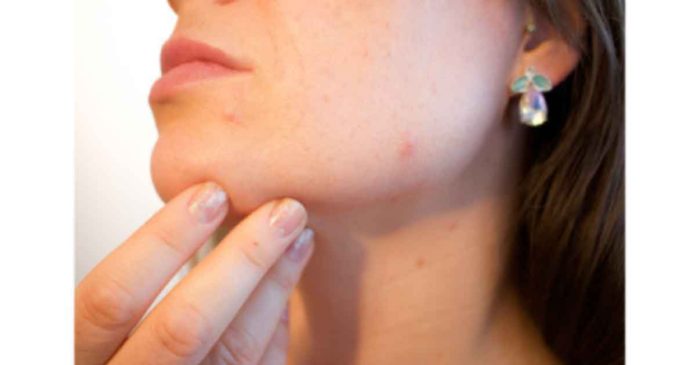Intestinal Health and Your Skin Is There A Connection? Have you had in the past some skin breakouts after eating certain foods? Now, there is scientific evidence that your skin problems may be due to not only by the foods that you eat, but also, by the way your stomach and gut functions.
Yes, there is truth to the fact that when you eat peanuts, you will have pimple breakouts, and when you eat some seafoods, you will have some rashes. See, gut health and skin health also have a connection in some ways.
Skin issues and gut issues have a long connection in history. This connection may be in a widely known effect of food sensitivities known as hives. When you were younger, you may have most likely heard advice on what foods to eat to avoid skin breakouts. An increasing number of studies are showing a solid relationship between skin issues and gut health, driving many to think that the gut microbiota may play a role in skin health.
The Gut-Skin Relationship
The gut and the skin share much in common and purpose. Skin and gut can protect your health and body from microorganisms around the environment. The neuroendocrine system can also play the role of being the sender and receiver of signals from the brain and to the different part of the body. In this hypothesis, stress lead to intestinal penetrability and dysbiosis in the gut. These processes also add to skin inflammation and skin diseases. During pregnancy until the age of two, the gut microbiome grows, after which, it can develop into the adult gut microbiome.
The Role of the Good Intestinal Bacteria
Recently, there has been much interest in the gut’s intestinal flora, also as the microbiome and its role in human health and diseases. Imbalance in the gut microbiome, regularly common as “gut dysbiosis” can lead to some diseases like inflammatory bowel disease, obesity, type 2 diabetes, atopic dermatitis and asthma.
The function of the gut microbiome is now becoming widely recognized. The gut microbiome plays an important role in the digestion of food, as the gut microbiota assimilates starches to produce short-chain fatty acids in the gut.
What Can Affect the Gut’s Normal Flora?
We are just beginning to comprehend the functions of the gut microbiome. Numerous things can change the gut microbiome, like the following:
Diet
Harmful effects of bad bacteria will lessen when taking a healthy diet, and will increase healthy bacteria like Firmicutes and Proteobacteria.
Age
As we age, our gut microbiome experiences continuous changes, making it more inefficient in its functions.
Oral Probiotics
Probiotics are living microorganisms with many health benefits. They are work by reestablishing the gut microbiome, decreasing gut irritation, and strengthening the immune system.
Prebiotics
These are non-living microscopic organisms, which can help invigorate certain beneficial colonic bacteria in the gastrointestinal tract.
Pregnancy
Gut microbiome will significally change over time through the first and third trimester of pregnancy that results to an increase of Proteobacteria and Actinobacteria.
Probiotics for Skin Care
Probiotics has the capacity to treat some skin issues particularly dysbiosis. A few investigations have discovered the alleviation for certain skin conditions with the daily intake of probiotics. Severe atopic dermatitis can get relief by taking probiotics that contain Lactobacillus rhamnosus GG. 4
Studies have additionally discovered a connection between dry skin and constipation. Phenols are dangerous metabolites from specific microscopic organisms that point to disturbances in the gut. These phenols can possibly lead to the separation of keratinocytes, which are cells in the skin. Some probiotics can help with the general wellbeing of the skin and can likewise help with wound recuperating.
Treating the Gut for Radiant Skin
Regardless of whether you have skin issues like rosacea or dermatitis, or whether you need to prevent the occurrence of skin diseases and aging, it is essential that you pay attention to your gut. Dysbiosis or other gut issues may be the reason for your skin issues, or it may worsen them.
You must consume the right diet, herbs, and supplements to promote gut health as well as skin health. Some essential supplements are for individuals with digestion issues such as celiac disease or small intestinal bowel obstruction (SIBO).
Vitamins
The essential nutrients for skin include vitamins A, C, E, and D. If skin aging is your concern, Vitamins C and E is a must to fight against harmful UV damage and oxidative stress in the skin. There are also some agents that helps improve the immune system and can help protect skin from aging, like carotenoids and omega-3 fatty acids.
To help rehydrate your dry skin, vitamin D should be taken. Lower intake of protein, phosphorous, potassium, vitamin A, and Vitamin C can lead to the development of more wrinkles for women in one study. Some minerals like zinc, selenium, and copper are important for a healthy skin. A lot of these give antioxidants can help restore the structure of the skin.
To achieve that healthy and youthful skin, you must include omega-3 and vitamin D-rich foods in your diet. These nutrients can give support to the skin and can help promote good functioning of the gut-skin axis. Don’t neglect to hydrate too.
Additionally, a healthy diet will likewise enable you to keep up with a healthy gut, particularly if you keep away from any foods that may trigger food allergies and inflammation. This will keep both the gut and the skin sound with the goal that they can continue shielding the body from the dangers of the outside world.




















